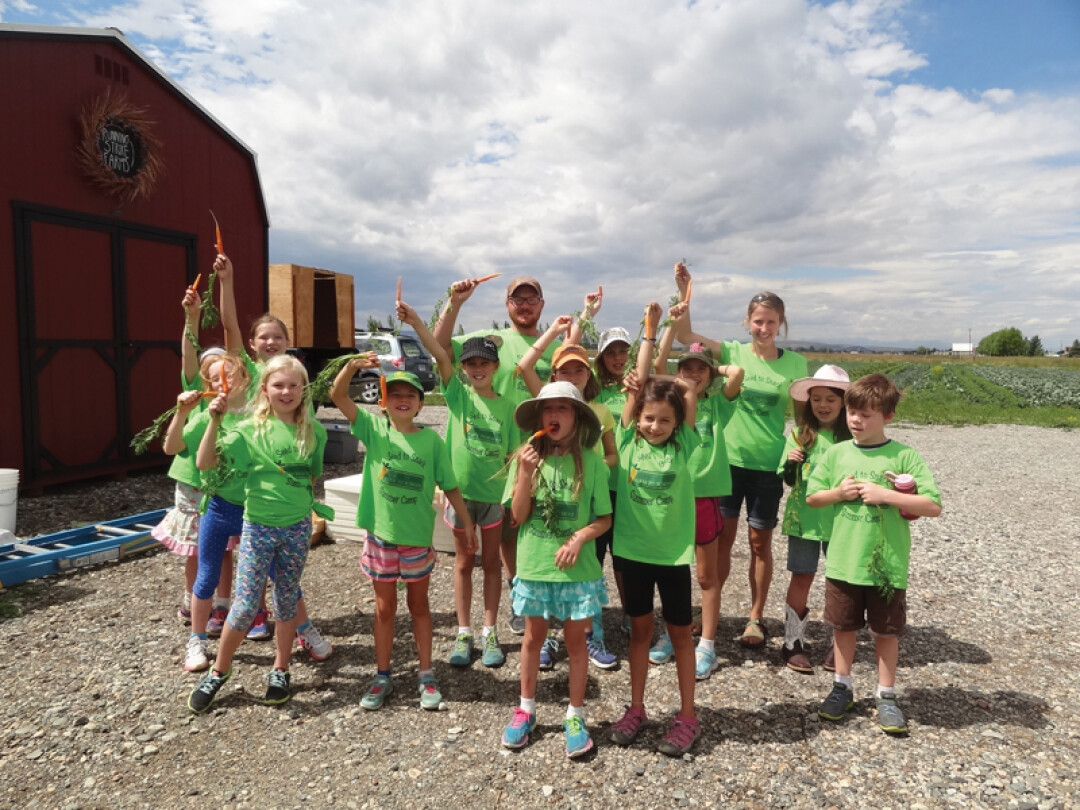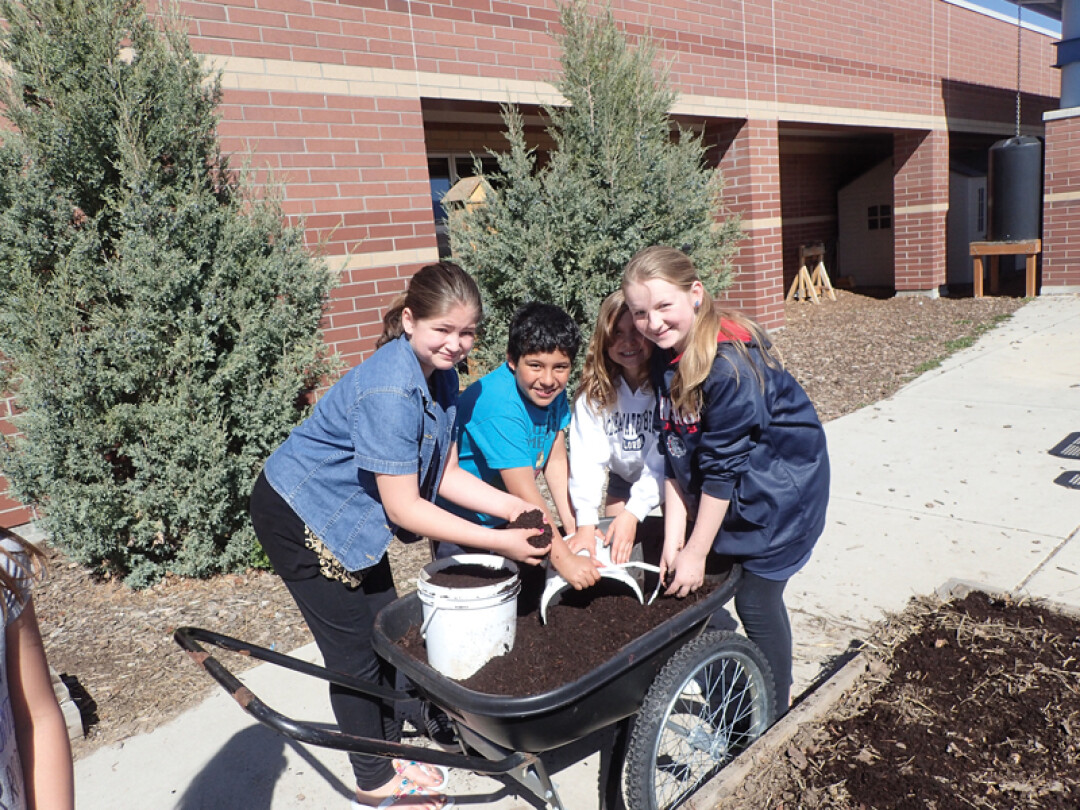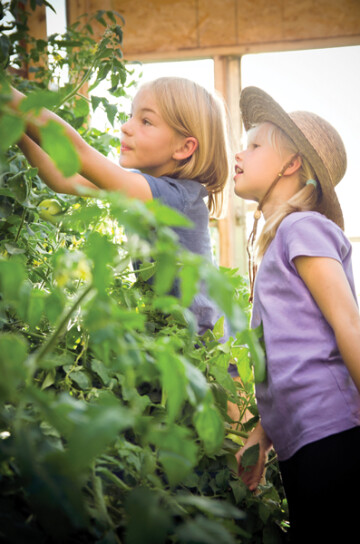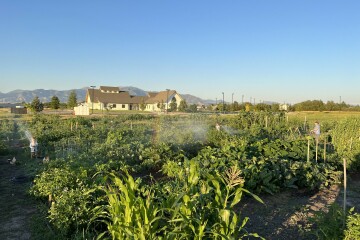How Do School Gardens Grow?
Cultivating Young Gardeners with Gallatin Valley Farm to School
A garden is a powerful place. It can transform kids into scientists, artists or mathematicians when concepts they learn in the traditional classroom suddenly become real. Gardens provide the ideal space for experiential learning, engaging all five senses in discovering the wonders of plants, cycles and ecosystems. When children help cultivate a garden, they form an intimate connection with food and the natural world and a sense of responsibility to a physical space and the living things within it—lessons that will stay with them far into the future. With spring in full swing here in the Gallatin Valley, now is the perfect time start a garden, and what better way to do it than by involving the youth in our community!

Healthy Gardens, Healthy Kids
School gardens are a hot topic in conversations about public health, modern agriculture and the environment right now, and for good reason. Most children consume at least half of their daily calories at school, so incorporating gardens into the school environment helps provide access to healthy, fresh foods. By using the garden as an educational space, students are involved in the growing process, become familiar with fresh foods straight from the garden and are more likely to try the vegetables they plant. This helps change kids’ attitudes toward trying new things, encouraging their curiosity to overcome the “yuck” factor often associated with unfamiliar foods. As a FoodCorps member and garden educator with Gallatin Valley Farm to School, I have heard countless students claim that they despise beets, tomatoes or “anything green.” But when they plant the seeds and watch spinach grow from sprout to a fully-formed plant, suddenly they are asking for seconds or thirds of the tasty sweet leaves! Many studies have shown that if a child takes part in growing, harvesting and cooking healthy foods, they are more likely to eat them. Involving kids in the gardening process helps them develop lifelong healthy eating behaviors and positive relationships with real food.
Stewardship: From the Gardens to the Wilderness
Garden-based education also fosters an understanding and appreciation of the natural world, turning kids into strong environmental stewards. After an activity introducing healthy soils, students turn the compost pile and let out excited squeals when they spot worms they have unearthed. They are able to see the full life cycle of a plant as it is returned to the soil and gain first-hand awareness of the importance of composting. Kids compare textures of different leafy greens, observe the pollination process in real time and search for ants as they clean up the garden floor. Through these experiences, they learn about the crucial role of every living thing in the garden and apply these same concepts to backyard and wild ecosystems.

Gardens Cultivate Teamwork and Practical Problem Solving
Gardens also provide tremendous benefits to children’s social and emotional well-being. Kids tend to regard gardens as safe, calm spaces where they are able to move slowly, take necessary time to observe their surroundings or to have a quiet moment. Cultivating a healthy garden can be a lot of work, so it lends itself perfectly to fostering teamwork, cooperation and group problem-solving skills. At Hyalite Elementary, students in second grade worked hard to write surveys for the school to determine the most popular garden vegetables and conquered their fears of speaking with older students about the gardens. In a lesson focused on creating a garden map, fourth graders at Hyalite worked in teams to develop one cohesive plan for the garden. This forced them to use spatial problem solving and to make compromises when picking and choosing which vegetable to plant where.
This learning doesn’t stop at the end of the school day, either. At all school gardens in Bozeman, educators and volunteers use the garden spaces after school to apply concepts learned in the classroom in a fun environment. Jonathan Bruce, aka Farmer Jonathan, After School Program Coordinator with Gallatin Valley Farm to School, says that this extension makes it easier for kids to transition from “I learned this at school,” to “Hey! I can do this at home!” The day after a lesson about carrots in which we made a carrot salad, I spoke with parents whose students raved about the “Carrot-tastic Creation” they wanted to recreate with their families.
In a garden, every kid contributes their skills and perspective, fostering empowerment and inclusion. Gardens teach kids about the importance of valuing all members of a community, as they learn first-hand the time and effort needed to produce fresh foods. In addition, gardening provides an outdoor activity that engages young minds at a time when kids are spending more and more time indoors behind screens. Whittier Elementary fifth grade students are hard at work designing their school garden, which will be built in the coming year. According to Farmer Jonathan, who has been helping to guide the planning, “It’s amazing to see how much ownership and leadership can develop around something kids otherwise might not invest in. Students have such wonderful and creative ideas!”

What’s Growing Near You
In school gardens across Bozeman, spring veggies are poking their first leaves out of the ground, fruit trees are blossoming and the soil is being worked in preparation for summer planting. At Irving Elementary, the garden serves as a vibrant outdoor classroom where exploration and learning takes place. Students spent the last two weeks with Gallatin Valley Farm to School preparing the beds and planting rows of spinach, peas, radishes, lettuce and carrots. They turned and sifted the compost and added it to the soil, participating in the amazing process of creating new life using decomposed plant matter. Before school is out for the summer, all students will take part in harvesting and enjoying the fresh vegetables straight from the soil. Irving recently received a grant that will help build cold frames for season extension and a Bokashi composting system that relies on anaerobic microbes to turn food and plant scraps into organic fertilizer—both strategies at the forefront of organic gardening in Montana.
At Meadowlark Elementary, the school gardens are currently being flipped from a neglected, weedy area to a functional outdoor learning space. The gardens were built with the help of 1000 New Gardens and feature six raised beds with a stunning view of the Bridger Mountains. In the coming weeks, students and teachers will weed and prepare the soil and seed spring crops for students to harvest before school is out for the summer. Next fall, students will receive specific garden-based lessons that reinforce concepts learned in the classroom.
The Hawthorne Elementary gardens have been similarly prepped and planted. Students in second, third and fifth grade will be taking field trips to Gallatin Valley Botanical and Amaltheia Organic dairy to experience food production on a larger scale. At a time when the average Montana farmer is 59 years old, it is more important than ever to encourage a connection with the farmers who grow our food!
At Monforton School, Farm to School programming is thriving. The school Wellness Committee is building a “neighborhood farm” relationship with Three Hearts Farm; students will visit the farm and have the opportunity to help seed in the spring and plant in the fall. Additionally, produce grown at Three Hearts will be featured in school lunch, thanks to the hard efforts of Food Service Director Erin Turner and her staff. Students will be able to learn how spring vegetables grow, see them in the school garden and on their salad bars!
Summer Opportunities: Seed to Snack Garden Explorer Camps
Summer in Bozeman is the perfect time to be outside, and what better place to be than in a garden? Gallatin Valley Farm to School’s Seed to Snack Garden Explorer Summer Camp is the ideal way for kids to dig into the wonders of the garden! Youth in grades 3-5 will learn how to grow and tend a garden and harvest fresh, healthy foods that they will use to cook delicious snacks every day. Students will create garden art, unleash their inner scientist as they observe and dissect flowers and insects, and become anthropologists as they examine our food system. We even take a field trip to a local farm! Gardening in Montana is an amazing way for kids to get dirty and have fun, which is exactly what summer is for. Camp sessions I and II take place July 11-15 and July 25-29 at the Hyalite Elementary School gardens, and session III is hosted at the Irving Elementary School gardens August 1-5. For more information about our camps, including scholarship opportunities, visit gvfarmtoschool.org/camps
Meghan Montgomery is the FoodCorps Service Member with Gallatin Valley Farm to School and Hyalite Elementary School. She loves spending time outside digging in the dirt, riding her bike or skating with the Gallatin Roller Girls.
